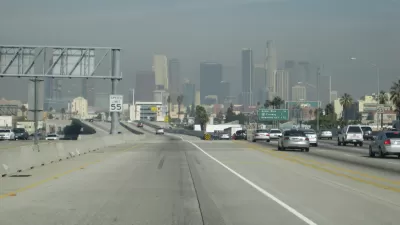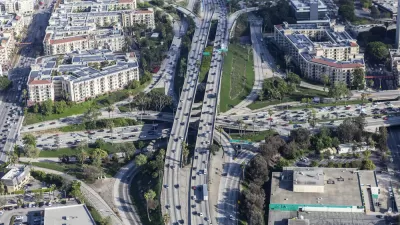After discussing a staff report on road pricing at their Jan. 24 meeting, Los Angeles County Metropolitan Transportation Authority directors paused to weigh the equity implications of charging motorists to drive on roads.

"The board considered a report from agency staffers that recommended road pricing, along with a host of other financing measures that could be used to accelerate construction of 28 projects that Metro aims to complete in time for the 2028 Olympics," reports Elijah Chiland for Curbed Los Angeles. The directors appeared to be stumped by equity considerations pertaining to lower-income drivers and disparate geographic transit availability.
“I am deeply concerned about how congestion pricing could be implemented in Los Angeles County,” wrote Supervisor Hilda Solis in a statement Thursday. “Before Metro moves further down this path, I feel it is critical to ensure that the benefits of congestion pricing are felt by all of our communities.”
The board approved a motion authored by Solis requesting that Metro develop an “equity strategy” and consult with academics, community groups, and local officials on ways to lessen impact on low-income drivers before crafting a congestion pricing policy.
Steve Hymon, the editor of The Source, a Metro publication, also reported on the board meeting, including his personal assessment of congestion pricing.
Congestion pricing is a regressive policy. If looked at strictly as a fee, then yes. But it’s a fee with associated progressive benefits: better transit, less pollution, fewer greenhouse gas emissions and time (and thus money) savings for many people, to name four. Fully acknowledging the pros and cons, I think, is more helpful when debating the issue.
Timely report from TransForm and Natural Resources Defense Council address the equity challenge
"Critics have long deemed congestion pricing a regressive policy that charges car-dependent people more to drive," writes Alissa Walker, Curbed's urbanism editor, on Jan. 29.
A well-timed new report—Pricing Roads, Advancing Equity—out today by TransForm and the Natural Resources Defense Council (NRDC), explains how congestion pricing can be employed as a tool to right engrained injustices in the U.S.’s current transportation system.
What used to sound radical now sounds like common sense—road pricing is urgently needed to address climate change, traffic, and inequity in the transportation system,” said the report’s co-author Stuart Cohen, executive director of TransForm. “We believe road pricing can be a transportation equity solution. It can speed buses and carpools while providing revenue to make mass transit more affordable.”
On that last note, Metro CEO Phil Washington proposed in December using the revenue to make transit free.
Carter Rubin, a mobility and climate advocate at the Natural Resources Defense Council, also weighs into the new report in the context of the Metro's congestion pricing study. "The main takeaway [from the Jan. 24 meeting] was that Metro staff should move forward only if improving equity is the centerpiece of congestion pricing."
Pricing Roads, Advancing Equity pulls together best practices and case studies to help cities and transportation agencies evaluate the social equity—or in most cases, inequity—of their transportation systems. And then it offers guidance on how the use of congestion pricing and reinvesting in mobility can improve social equity in transportation.
What remains to be seen is what type of congestion pricing, if any, is selected by the board. Metro is considering three options: cordon pricing, similar to what has been successfully implemented in London, Singapore, and Stockholm; a mileage fee, similar to the road usage charge in Oregon and a pilot project conducted from July 2016 through March 2017 by the California State Transportation Agency, and a corridor charge applied to 10 corridors.
The full Metro board meets next on Feb. 28 and will resume discussion of the report, "The Re‐Imagining of LA County: Mobility, Equity, and the Environment. "The Ad Hoc Congestion, Highway and Roads Committee meets on Feb. 20.
Related recent posts:
-
Transit Agency Chief to Propose Congestion Pricing for Los Angeles, January 21, 2019
FULL STORY: Metro directors question fairness of congestion pricing

Study: Maui’s Plan to Convert Vacation Rentals to Long-Term Housing Could Cause Nearly $1 Billion Economic Loss
The plan would reduce visitor accommodation by 25,% resulting in 1,900 jobs lost.

Alabama: Trump Terminates Settlements for Black Communities Harmed By Raw Sewage
Trump deemed the landmark civil rights agreement “illegal DEI and environmental justice policy.”

North Texas Transit Leaders Tout Benefits of TOD for Growing Region
At a summit focused on transit-oriented development, policymakers discussed how North Texas’ expanded light rail system can serve as a tool for economic growth.

Paris Bike Boom Leads to Steep Drop in Air Pollution
The French city’s air quality has improved dramatically in the past 20 years, coinciding with a growth in cycling.

Why Housing Costs More to Build in California Than in Texas
Hard costs like labor and materials combined with ‘soft’ costs such as permitting make building in the San Francisco Bay Area almost three times as costly as in Texas cities.

San Diego County Sees a Rise in Urban Coyotes
San Diego County experiences a rise in urban coyotes, as sightings become prevalent throughout its urban neighbourhoods and surrounding areas.
Urban Design for Planners 1: Software Tools
This six-course series explores essential urban design concepts using open source software and equips planners with the tools they need to participate fully in the urban design process.
Planning for Universal Design
Learn the tools for implementing Universal Design in planning regulations.
Smith Gee Studio
Alamo Area Metropolitan Planning Organization
City of Santa Clarita
Institute for Housing and Urban Development Studies (IHS)
City of Grandview
Harvard GSD Executive Education
Toledo-Lucas County Plan Commissions
Salt Lake City
NYU Wagner Graduate School of Public Service





























